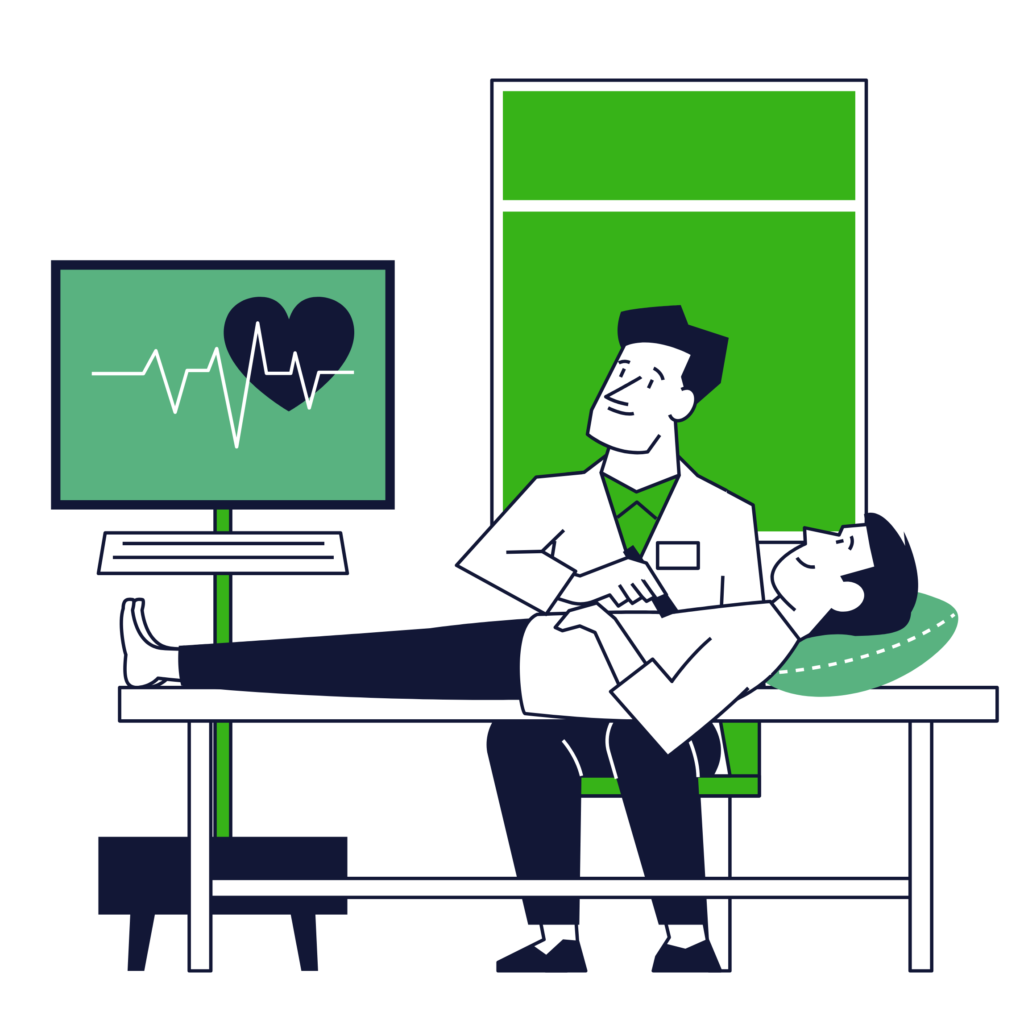Holter Test at
Delhi Heart Hospital
Accurate Holter Test
for Better Heart Health
At Delhi Heart Hospital, we offer advanced Holter Test services to monitor and assess your heart’s activity over an extended period. Our state-of-the-art technology and expert cardiologists ensure accurate detection of irregular heart rhythms, arrhythmias, and other cardiac conditions for effective treatment planning.
Book An Appointment
OPD patients served
Years Of Experience
IPD Patients served

Delhi Heart Hospital : Your Trusted partner in Cardiac care for All Chest Pain issues!
At Delhi Heart Hospital, we are dedicated to providing exceptional cardiovascular care to our patients. Our state-of-the-art facilities and highly skilled medical team ensure that you receive the best possible treatment and care for all your heart health needs.
Our Core Services
Get Tested at East Delhi's Premium heart Centre
2D ECHO
A non-invasive heart test using sound waves to create a 2D image of heart structure & function.

Stress ECHO & TMT
Heart test that combines exercise with ECG & 2D-ECHO to assess heart function under stress.

Holter Study
A wearable heart monitor that records heart rhythm & detects irregularities over 24 hours.

Inpatient & Critical Care
Rest easy knowing experienced doctors provide top-tier critical care during hospital stay.

Cardiology & Chest OPD
Receive expert cardiology and respiratory care from experienced doctors at our OPD service.

24 x 7 Pathology Lab Service
Accurate and reliable pathology lab services for precise diagnosis and effective treatment.

Delhi Heart Hospital's
Comprehensive Holter Test
Understand Your Heart’s Health with 24 hour holter monitor
Our experienced cardiologists use advanced holter monitoring machine to provide detailed reading of your heart, helping diagnose and manage various cardiac conditions.
Other Tests

Treadmill Test (TMT)

Ambulatory BP Monitoring
We use the latest echocardiography equipment to ensure high-quality imaging and reliable results.

Holter (24 hours ECG)
Holter study is a non-invasive diagnostic test that records the heart's electrical activity over a 24-hour period.
Echo Scan
Why Choose Our Holter Test Services ?
At Delhi Heart Hospital, we specialise in delivering precise and comprehensive ecg holter monitoring, ensuring accurate diagnostics and personalized care plans with our Holter monitoring machine

Happy Patients
Heart Procedures
Years Of Experience
Cardiac Specialist Staff
Echo Scan
Let's Understand Holter Test better!
Holter Test
Understanding Holter Test - Why do you need Heart Holter Monitor for 24 hours
Living with unexplained heart symptoms can be nerve-wracking, which is why many patients turn to a comprehensive Holter scan to get peace of mind. A Holter monitor test is a game-changer for individuals struggling with mysterious cardiac issues, offering a window into your heart’s secret rhythms that traditional tests might miss.
Unlike a brief snapshot ECG, this clever device tracks your heart’s performance around the clock, typically monitoring your cardiovascular activity for 24 to 48 hours. Doctors recommend a Holter scan when patients report persistent symptoms like chest discomfort, random palpitations, or dizzy spells that come and go without warning.
Whether you’re experiencing occasional heart flutters or more concerning chest pain, a Holter monitor can help healthcare providers unravel the mystery. Most diagnostic centers now offer these scans at reasonable prices, making it easier than ever to get a comprehensive heart health assessment. By capturing every heartbeat in real-time, this test can detect irregular rhythms, potential arrhythmias, and underlying cardiovascular conditions that might otherwise go unnoticed.
The best part? The Holter scan is completely non-invasive. You’ll simply wear a small, lightweight device that records your heart’s electrical activity as you go about your daily routine – from working and exercising to sleeping. It’s like having a heart detective working 24/7 to understand what’s really going on inside your cardiovascular system.

What is a Holter Test?
Holter tests are crucial for:
- Diagnosing irregular heart rhythms
- Evaluating unexplained symptoms like dizziness or fainting
- Monitoring heart function in patients with known heart conditions
- Assessing the effectiveness of heart medications
- Investigating potential heart-related issues that don’t show up in standard ECG tests
Do I need a Holter test?
Patients may be recommended a Holter test if they experience:
- Irregular heartbeats
- Unexplained chest pain
- Frequent dizziness or lightheadedness
- Potential arrhythmias
- Symptoms of heart palpitations
- History of heart disease
- Monitoring of existing heart conditions
Why is a Holter Test Done?
A Holter test is performed to
- Diagnose heart rhythm abnormalities that may not be detected during a short ECG.
- Investigate unexpected and unexplainable symptoms like:
- Dizziness
- Fainting spells
- Chest pain
- Heart palpitations
- Evaluate the effectiveness of heart medications
- Monitor patients with known heart conditions
- Detect irregular heart rhythms that occur intermittently
- Assess overall heart electrical activity over an extended period
Can Holter Detect Blockage?
A Holter monitor cannot directly detect heart blockages or arterial blockages. It primarily monitors:
- Heart rhythm
- Electrical activity of the heart
- Heart rate variations
For detecting heart blockages, other tests are more appropriate:
- Coronary angiography
- Stress tests
- CT angiography
- Cardiac MRI
However, a Holter test can indirectly suggest potential issues that might indicate underlying blockage, such as:
- Irregular heart rhythms
- Reduced heart function
- Abnormal ECG patterns
What Will a Holter Monitor Detect?
A Holter monitor can detect:
- Arrhythmias (irregular heart rhythms)
- Tachycardia (fast heart rate)
- Bradycardia (slow heart rate)
- Premature heartbeats
- Heart rhythm variations during different activities
- Potential heart conduction problems
- Silent heart events
- Correlation between symptoms and heart activity
- Impact of medications on heart function
- Potential signs of:
- Heart stress
- Reduced blood flow
- Electrical system irregularities
Is Holter Better Than ECG?
Differences between Holter and ECG:
Holter Monitor Advantages:
- Continuous monitoring (24-48 hours)
- Captures intermittent heart events
- Tracks heart activity during daily activities
- More comprehensive view of heart function
Standard ECG Advantages:
- Immediate results
- Quick snapshot of heart electrical activity
- Less expensive
- No equipment to carry
Best Use:
- ECG for initial screening
- Holter for detailed, extended monitoring
Can Holter Detect Heart Failure?
You will have to talk to your doctor for understanding what suits you.
Holter monitors can provide insights into potential heart failure by detecting:
- Irregular heart rhythms associated with heart failure
- Abnormal heart rate variations
- Signs of heart stress
- Electrical conduction problems
However, definitive heart failure diagnosis requires:
- Echocardiogram
- Cardiac MRI
- Blood tests
- Comprehensive medical evaluation
What Happens if Holter Monitor Results Are Abnormal?
If Holter monitor results show abnormalities:
- Healthcare provider will review detailed results
- Possible follow-up tests may include:
- Echocardiogram
- Stress test
- Cardiac MRI
- Blood tests
- Potential treatment options discussed:
- Medication adjustments
- Lifestyle changes
- Further diagnostic procedures
- Potential referral to a cardiologist
Can a Holter Monitor Detect Blood Pressure?
No, a Holter monitor cannot detect blood pressure. It specifically monitors:
- Heart electrical activity
- Heart rhythm
- Heart rate
For blood pressure monitoring:
- Use a separate blood pressure monitor
- Automatic or manual blood pressure cuffs
- 24-hour ambulatory blood pressure monitoring

